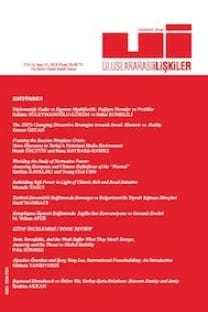Postmodern ve Çokkültürcü Bir Alan Olarak Avrupa Birliği: Teknikleşen Siyaset ve Ulusal Demokrasilerin Açmazı
AB’nin genişleme siyasetinin temel ilkeleri 1990’lı yılların ortasında Birliğin Doğu Avrupa’ya genişleme kararı almasının ardından tanımlanmaya başlanmıştır. Karşılıklı müdahale ilkesine bir meta-norm statüsü veren AB, Robert Cooper’ın tanımladığı gibi, uzun bütünleşme sürecinde postmodern bir devlet biçimini almıştır. AB’nin genişleme politikası, AB’nin postmodern politika alanına tamamen katılmamış adayların modern ulusal devletler oldukları varsayımına dayanarak, bütünleşme siyasetinden farklı olarak gerçekçi terimlere göre oluşturulmaktadır. Postmodern bütünleşme siyasetine özgü demokratik eksiklikleri ve/veya meşruiyet zafiyeti gibi yapısal sorunları müktesebata uyum sürecinde AB’nin aday ülkelere ihraç ettiği iddia edilmektedir.
Anahtar Kelimeler:
Avrupa Birliği, Küreselleşme, Genişleme, Demokratik Eksiklik, Müktesebat Siyaseti
European Union as a Postmodern and Multicultural Space: Technicalization of Politics and the Dilemmas of National Democracies
Basic principles of the EU's politics of expansion have begun to be laid down since the mid-1990s following the historical decision to expand the Union towards Eastern Europe. By giving a meta-norm status to the principle of reciprocal intervention, the EU, as described by Robert Cooper, has taken the form of a postmodern state during the long process of integration. Unlike the integration policy, the EU formulates its expansion policy on realistic terms assuming that the candidates, which are not fully incorporated into the postmodern policy realm of the EU, are modern nation states. It is argued that the structural problems such as democratic deficit and/or the erosion of legitimacy inherent to the EU's postmodern integration politics have been exported to the candidate states in the process of the adaptation of the acquis communautaire.
Keywords:
European Union, Globalization, Enlargement, Democratic Deficit, Politics of Acquis Communautaire,
___
- ....
- ISSN: 1304-7310
- Başlangıç: 2004
- Yayıncı: Uluslararası İlişkiler Konseyi Derneği İktisadi İşletmesi
Sayıdaki Diğer Makaleler
Küreselleşme, Avrupa Birliği ve Türkiye Üçgeninde Kimlik Parçalanması ve Kimlik Yönetişimi
Küreselleşme ve Türk İşadamları Derneği: TÜSİAD Örneği
Küreselleşen Kültür ve Değişen Yerleşik Siyasal Konumlar
Küreselleşme ve Bilgi Toplumu: Eğitimin Küreselleşmesi ve Neo-Liberal Politikaların Etkileri
Mehmet DİKKAYA, Deniz ÖZYAKIŞIR
Uluslararası İlişkilerde Küreselleşme Olgusu ve Ulus-Devlet Kavramını Yeniden Düşünmek
Küreselleşme, Uluslararası İlişkiler ve Hegemonya
